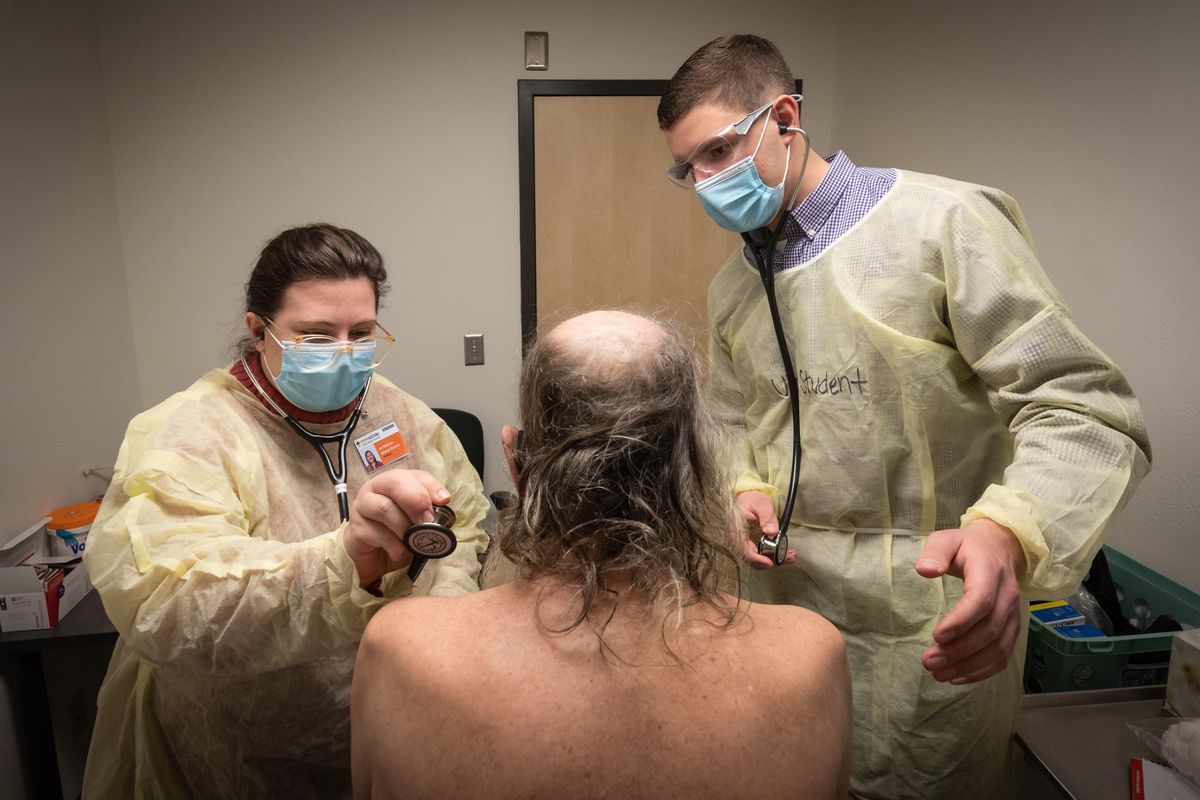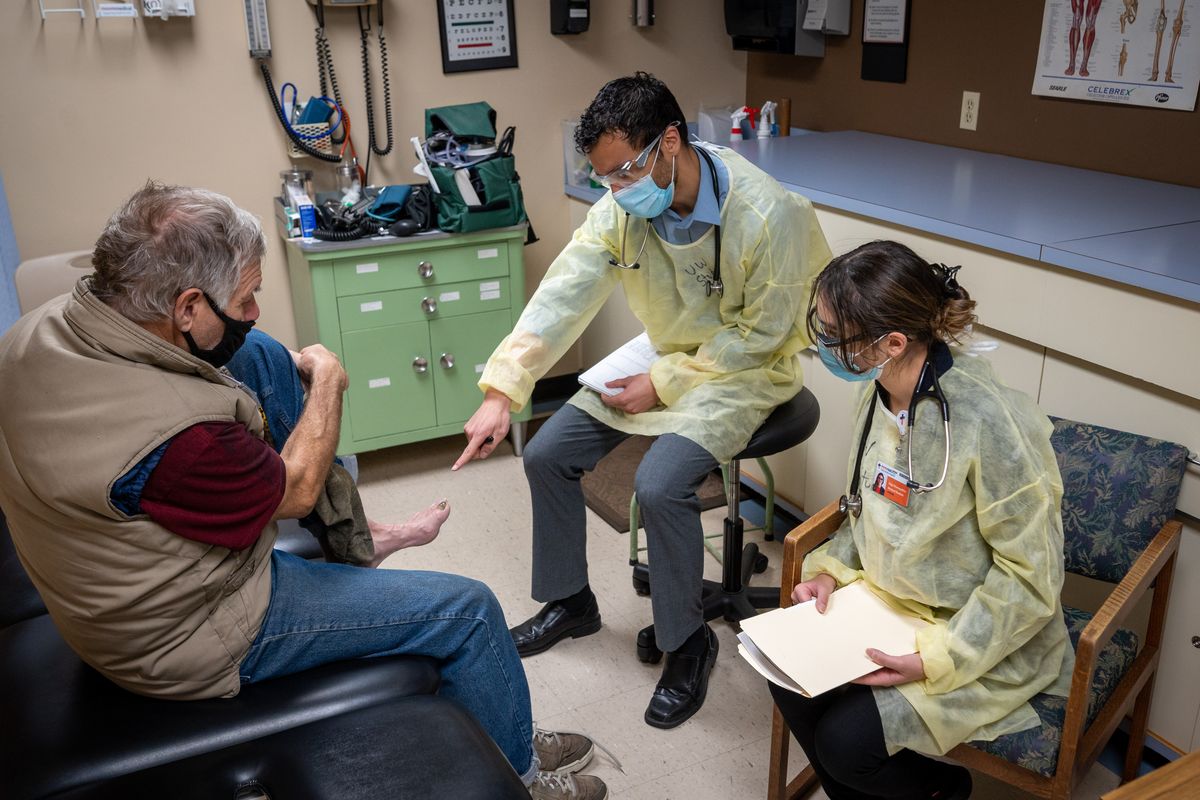‘God’s Christmas gift has been our UW students’: Medical school students volunteer at UGM clinic amid COVID-19
University of Washington first-year medical student Ali Alderson and second-year student Conor Linehan examine a Union Gospel Mission resident Dec. 12 at the Union Gospel Mission Free Clinic. Spokane-based medical students from UW have worked out a way to continue service learning through volunteer work at the Union Gospel Mission during the pandemic. (Colin Mulvany/The Spokesman-Review)
A handful of medical students recently delivered on a gift of service for Union Gospel Mission’s free medical clinic.
Since mid-October, UGM patients have received care each Saturday from first- and second-year medical students in the University of Washington School of Medicine-Gonzaga University Regional Health Partnership.
A student group for several months sought approvals on COVID-19 protocols to resume their service learning, and it’s a welcome return, said UGM clinic coordinator Annie Crain. The students’ volunteering had halted in March with statewide pandemic shutdowns.
“We love our UW med students; they’re awesome,” Crain said. “They just bring a lot of energy and joy to Union Gospel Mission. It’s definitely not the same without the medical students there.”
UW has students in Spokane as part of WWAMI, a five-state regional program. A group here volunteers under UWSOM’s Homeless Outreach and Inter-Professional Education, or HoiPe, helping at UGM and Providence House of Charity medical clinic. That latter service is expected to resume in early 2021.
Now, a total of six medical students can volunteer each Saturday at UGM on Trent Avenue, where a clinic has three exam rooms.
Wearing protective gear including masks and gowns, the students work in teams of two to conduct patient interviews and exams. They’re overseen by a volunteer doctor or nurse practitioner.
The students mostly see patients from the men’s shelter. However, the clinic is open to anyone, Cain said. UGM also operates a Wednesday medical clinic that doesn’t involve the UW students.
Under new protocols for Saturday clinics, the UW students don’t see anyone who has COVID-19 symptoms and don’t do any COVID-19 testing. Student volunteers fill out a form each time.
UGM also follows Spokane Regional Health District guidelines for COVID-19 safety, which is what UW student leader Conor Linehan used as a base for the student group for initially seeking approvals from university leaders.
“It was definitely iffy for a while,” said Linehan, as the HoiPe student director. “It wasn’t until around mid- to late summer of this year that I really started thinking it was going to be a realistic goal to get things back on track.”
Linehan, a Spokane resident since third grade, is a second-year UWSOM student here. He said UW students have returned for about nine clinics so far. They’ll take Christmas week off.
“They’ve all gone well,” Linehan said. “The spots have been filling up like crazy, which is always exciting to see for someone who is passing this role off to a group of first-year students.”
Since lectures and studies have remained mostly virtual, he said the clinic interactions among students help create bonds. First-year students are paired with another student typically in the second year of medical school.
“The first-years do most of the interviewing and physical exam, while the upperclassman takes a more passive role and chimes in if there is anything necessary to be added,” he said.
“It’s pretty much a way for upperclassmen and first-years to interact in a clinical setting while also allowing first-years to develop some of their clinical skills. But it’s also helpful to us. We’re usually very hands on.”
After exams, the student team presents each case to the volunteer physician or nurse practitioner. The health professionals share knowledge and training, as they and students then see the patient for a final course of action.
Linehan said he also enjoys hearing patient stories and being encouraging. He took a gap year between undergraduate school and medical school from spring 2018 to fall 2019. In between, he volunteered at UGM first as a meal server, then offering basic assistant work in the clinic.
“That actually made me more motivated to volunteer with UGM when I actually started medical school.”
Daniel Brewer, a first-year medical student, is transitioning into Linehan’s role. He started volunteering at UGM in November.
“From a student perspective, the work we’re doing is incredibly meaningful,” Brewer said. “This is an unprecedented difficult time, and there is a huge need, especially for vulnerable and underserved populations who don’t necessarily have the same access to resources.”
“From the patient perspective, whenever we’re interacting with all of our patients who come to the clinic, they’re always excited to let students work on getting experience, practicing their physical exams and medical history taking. They seem to enjoy creating a learning opportunity for us.”
The medical students have limited extra hours beyond their school requirements to volunteer, said Dr. Rocky Kerr, mentor adviser for the UW students in the group. At the clinics, however, students get to help people in need while seeing a variety of medical conditions.
“It’s lots of lumps and bumps, lots of rashes, medication refills, back pain, colds, run-of-the-mill stuff, but that’s good,” Kerr said. “A lot of these students haven’t seen that. It’s a good opportunity to learn about ambulatory medicine and the nuts and bolts of taking care of common problems.”
After 25 years as an ER doctor at Sacred Heart Medical Center, Kerr retired about two years ago. It’s fun to see the students’ excitement, he said.
“It is just a blast working with the students and seeing the youthful enthusiasm they bring to medicine for someone like myself who has been doing this for decades,” he said. “You see something that might be commonplace, but it’s new and different when you see it in their young eyes.”
Brewer said the students have seen a variety of cases, from a request for adjusted medication after a stroke to minor infections and heart murmurs. In the future, the student group is interested in seeing if they can help with a COVID-19 vaccine distribution, he said.
“We’re currently in talks trying to figure out what that vaccine distribution would look like for the homeless community. A goal of our group is to see how we can make that available to our patients.”
Overall, Cain at UGM said the student connection benefits patients and co-workers.
“The students here at the clinic are excited to learn and excited to listen,” Cain said. “If you’re a homeless person, you need someone to listen and someone who cares. It’s humbling to be around them because they are so excited to learn and engage with our people.”
UGM clinic workers have the time, and, now again, extra attention from students for patients.
“God’s Christmas gift has been our UW students,” Cain said. “We’re so thankful they’re back.”

